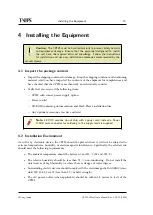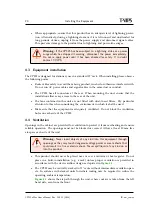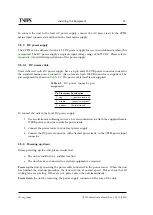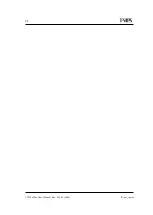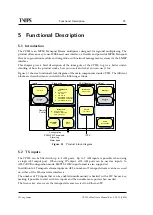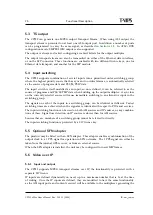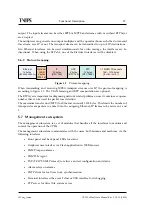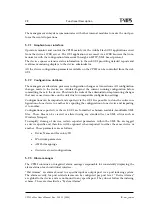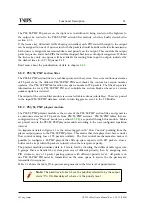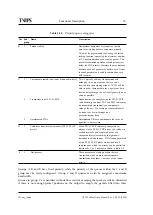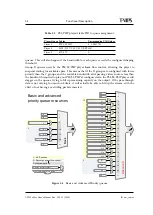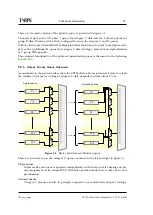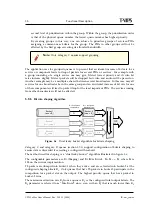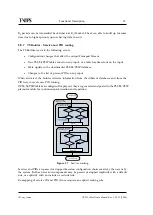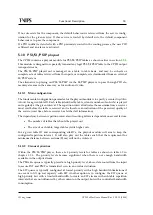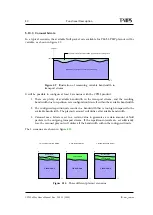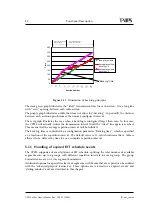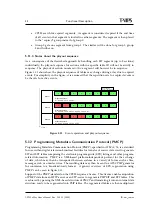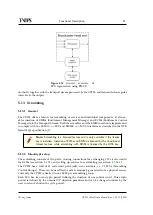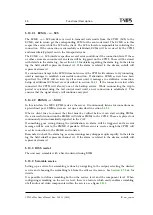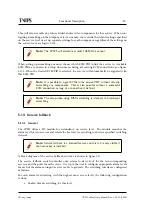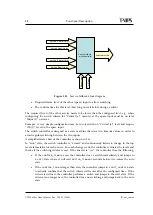
Functional Description
33
ID: um_tsmux
CP525 cMux User’s Manual Rev. 5.20.12 (3944)
Table 5.4.b
Priority queue categories.
Cat. Sub-
group
Name
Description
B
1
Forced stuffing
Downstream equipment may require a certain
amount of stuffing packets to operate properly.
This may be guaranteed by activating the forced
stuffing function, specifying the maximum number
of TS packets between each stuffing packet. This
packet transmission operates at fixed priority just
below the MIP inserter, therefore the max distance
between each null packet may deviate with 1 from
the configured value if used in combination with
MIP insertion.
C
1
Components routed from input (video/audio/data) This is typically audio or video components
belonging to an input service that are to be
inserted into the outgoing stream. CP525 will be
able to buffer these packets for a significant time,
but the delay through the unit shall generally be as
short as possible.
2
Transparent input PSI/SI/PSIP
Dependent on the configuration for PSI/SI/PSIP
table handling, the input PAT and PMT tables may
be transmitted transparently as components
through the unit. No caching of these tables will
be done; they are let through on a
packet-by-packet basis.
3
Unreferenced PIDs
Unreferenced PIDs are components that are not
signalled in any services.
D
1
Table data from internal carousels (PSI/SI/PSIP
player)
When PSI/SI/PSIP tables are configured for
playout via the PSI/SI/PSIP player, the tables are
cached internally and are played out at the
configured intervals according to algorithms
described in this document. PID streams generated
by the PSI/SI/PSIP player are devided into 3
sub-groups on which the priority can be controlled
individually. The 3 queues are shown in table
E
1
Null packets
These packets are stuffing packets that are
transmitted when no other source requests
transmission of packets, i.e always at the lowest
priority.
Groups A, B and E have fixed priority, while the priority of the queues within the C and D
group may be freely configured. Group C and D queues can also be assigned a maximum
bandwidth.
Queues in group C are handled without flow control, meaning that packets will be discarded
if there is not enough packet positions on the output to empty the packets filled into these
Summary of Contents for CP525 cMux
Page 2: ......
Page 10: ......
Page 12: ...12 CP525 cMux User s Manual Rev 5 20 12 3944 ID um_tsmux ...
Page 18: ...18 CP525 cMux User s Manual Rev 5 20 12 3944 ID um_tsmux ...
Page 24: ...24 CP525 cMux User s Manual Rev 5 20 12 3944 ID um_tsmux ...
Page 66: ...66 CP525 cMux User s Manual Rev 5 20 12 3944 ID um_tsmux ...
Page 238: ...238 CP525 cMux User s Manual Rev 5 20 12 3944 ID um_tsmux ...
Page 248: ...248 CP525 cMux User s Manual Rev 5 20 12 3944 ID um_tsmux ...
Page 276: ...276 CP525 cMux User s Manual Rev 5 20 12 3944 ID um_tsmux ...

